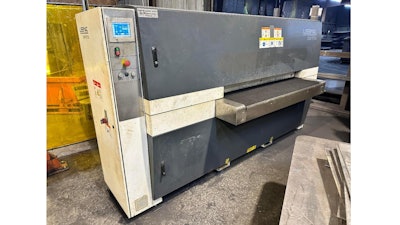
Steel Mart, a leader in steel processing, is known for its commitment to providing high-quality products and solutions to the construction machinery and waste handling industries. Specializing in light and medium plate steel, Steel Mart processes raw flat plates into finished, direct-to-consumer products, including parts for construction machine attachments and trenching tools, ranging from 100 to 18,000 pounds.
As the company has expanded, it has faced challenges with its manual cleaning processes. This case study explores how LISSMAC's advanced cleaning solution helped Steel Mart overcome these challenges, significantly enhancing their productivity and worker safety.
The Challenge: Manual Cleaning Limitations
Steel Mart’s previous cleaning process was highly labor-intensive and inefficient. With eight CNC tables producing parts, the cleaning process required 184 hours of machine time to be handled manually.
The ratio of production time to cleaning time was approximately three hours of production to one hour of cleaning. However, the manual process could not keep up, resulting in backlogs and increased labor costs. The manual cleaning process, which involved chisels, hammers and handheld de-slagging machines, was not only physically demanding but also one of the least sustainable job positions within the company.
"We were using outdated methods that just couldn't keep up with the demand," Steel Mart Vice President of Operations Nick Alspach said. "Manual cleaning required eight people working full shifts, which was not the type of job we wanted to offer to our community. We needed a safer, cleaner, and more efficient solution."
In addition to the inefficiency, the manual cleaning process posed health risks to employees, including exposure to airborne particulates and risk of carpal tunnel syndrome from repetitive movements. Realizing the need for a more sustainable and ergonomic solution, Steel Mart spent six months researching and discussing potential options.
The Search for a Solution
Determined to find a better solution, Steel Mart’s management attended FABTECH, an industry-leading trade show. Armed with a list of eight potential manufacturers, they met with representatives to explore their offerings. LISSMAC was the third company they spoke with, and their approach immediately stood out.
Glenn Miller, LISSMAC's Sales Manager for the Midwest, followed up promptly after the initial meeting, visiting Steel Mart's facility within two weeks to assess the situation firsthand.
The LISSMAC Solution: SMB-M 1500-D2
After a thorough assessment, LISSMAC recommended the SMB-M 1500-D2, a state-of-the-art machine designed to streamline Steel Mart’s cleaning processes. The installation of the machine marked a turning point for Steel Mart.
On the day of installation, Steel Mart's area manager was instructed to bring a machinery skid that needed cleaning. The manual cleaning process previously took six hours to complete.
However, the LISSMAC machine finished the job in just 30 minutes, producing cleaner parts and immediately easing downstream processes. The ergonomic design of the machine also addressed concerns about worker health, reducing the risk of carpal tunnel syndrome and improving overall air quality by capturing slag in larger chunks and incorporating magnetic collection.
"The difference was night and day," Alspach said. "We went from struggling to keep up with manual cleaning to having a machine that not only increased our productivity but also made the workplace safer for our employees."
Dramatic Improvements in Efficiency and Cost Savings
The introduction of the LISSMAC SMB-M 1500-D2 resulted in significant cost savings and productivity gains for Steel Mart. The company realized six-figure savings annually in labor costs alone, thanks to the drastic reduction in manual cleaning hours. Moreover, productivity increased by 300%, allowing Steel Mart to reallocate labor resources to other critical areas of the business.
The machine’s impact extended beyond just labor and productivity improvements. The cleaner, more efficient process enhanced the overall quality of the parts produced, which in turn improved the performance of Steel Mart’s products in the field. This was particularly important for their customers in the construction machinery and waste handling sectors.























